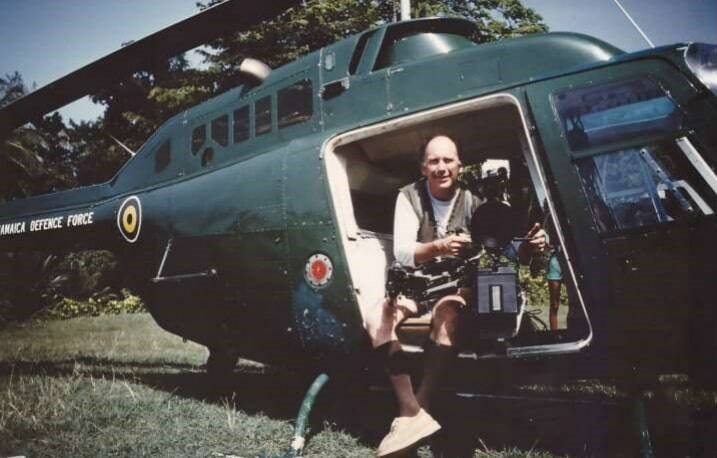Among his childhood memories, Dave Crone remembers porters pushing him around Toronto Airport. If he was there, airlines knew that one of their best customers, Dave's dad Bob Crone, was touching down.
Bob Crone was a pioneer and lifelong advocate for filmmaking in Canada. As a documentary filmmaker, he was the first cameraman for the CBC that travelled for international coverage.
Always pushing the technological envelope, Crone was among the first to embrace the Steadicam, and IMAX film format. Bolstering the domestic industry, he founded a thriving studio and established a union chapter among international camera operators.
Crone died Jan. 12 at the age of 90, survived by his wife Vi, son Dave, three grandchildren and great granddaughter. He lived in West Vancouver.
To promote filmmaking for future generations, an annual scholarship is being set up in Crone’s name at Capilano University.
Travelled the world for CBC with Larry Henderson
Growing up in Toronto, Crone’s father gave him a camera at age 12, which led to an immediate love of photography that would soon carry over to motion pictures. After taking film courses in New York in 1955, he moved back to Canada. There, he was hired by the CBC for a couple weeks, but soon quit to work freelance, selling his stories back to the public broadcaster.
As he became increasingly known for his skilful camera work, the CBC began sending Crone abroad for a wide variety of documentary work. He flew around the globe with announcer Larry Henderson, filming world events with his wife and business partner Vi, who was also known for her skill behind the camera.
Crone filmed the likes of political figures including the former president of the Socialist Federal Republic of Yugoslavia, Josef Broz Tito, as well as Cuban revolutionary and former president Fidel Castro.
“Castro marched out of the mountains to go loot [Fulgencio] Batista’s office,” Dave said, pointing to photographs still in his family’s possession.
On home soil, Crone shot powerful footage of Doukhobors in New Denver, B.C. protesting the abduction of their children in 1957. His filmmaking of interviews with leaders and confrontations of nude protestors and RCMP was shown to Canadians on CBC TV. Two weeks after the footage aired, the children were released.
Drove film industry forward in Canada
At age 27, he bought a house in Rosedale, Toronto.
“He modified the basement – put in a full studio with lighting, an editing facility, makeup rooms, interlocked projectors and machines to do his own mixing down there,” Dave said. “It became a studio of choice by the CBC for a lot of their executive interviews and stuff because it was quiet.”
One of the projects that Crone remembered most fondly was the election campaign for former prime minister Lester B. Pearson.
“Just the amount of involvement he got into and the time spent with him,” Dave explained. “[The Liberal Party] would write the speeches and then come down to the house and film Pearson in our basement, edit the show and then put it on CBC for his campaign.”
Similarly, Crone also filmed speeches and other works for Pearson’s successor, Pierre Trudeau.
Part of Crone’s contributions to contemporary filmmaking was his embrace of new technology.
“He was always an innovator. He was always thinking outside the box,” Dave said. In 1976, Crone became the third person in Canada to own a Steadicam. Not only did he use the technology extensively himself, but he also taught other camera operators in the U.S. and throughout Asia, Dave added.
After founding his own Canadian studio, Filmhouse, he brought in mixing boards from Holland to produce North of Superior, the first IMAX film.
CapU scholarship a 'fitting memorial'
As Steadicam work began ramping up, Dave joined his dad, and they shot a number of documentaries as a two-man crew. “It was great working with him,” Dave said. Nicknamed “Smiley,” Crone was known for being upbeat and never carrying anger.
“He was a great man,” Dave said. “He’s left a big hole in our lives.”
In 1988, Crone and his wife moved to West Vancouver. He retired in 1996. Crone loved living in the community, Dave said, and volunteered with the West Vancouver Presbyterian Church.
But Crone suffered from Parkinson’s disease, and wasn’t able to recover from a fall in 2022. “In a way his passing was a great relief,” Dave. “It’s nice to know that he’s in a peaceful place.”
Dave said he had spoken with his dad over the past few years to set up a scholarship in Crone’s name.
“It just seemed like such a fitting memorial,” Dave said, adding that the Bob Crone Memorial Scholarship will be available at Capilano University within the next couple of years.
He hopes that the scholarship will give future filmmakers a head start in an industry that needs the kind of passion that his father had. “It’s a love – it’s not a job,” Dave said.



